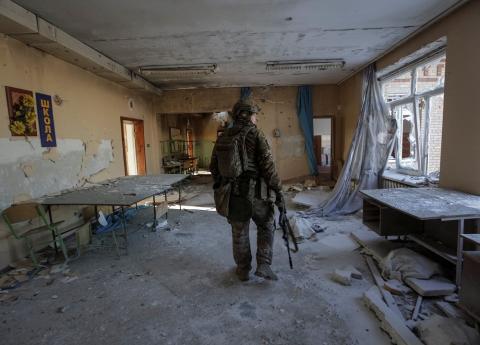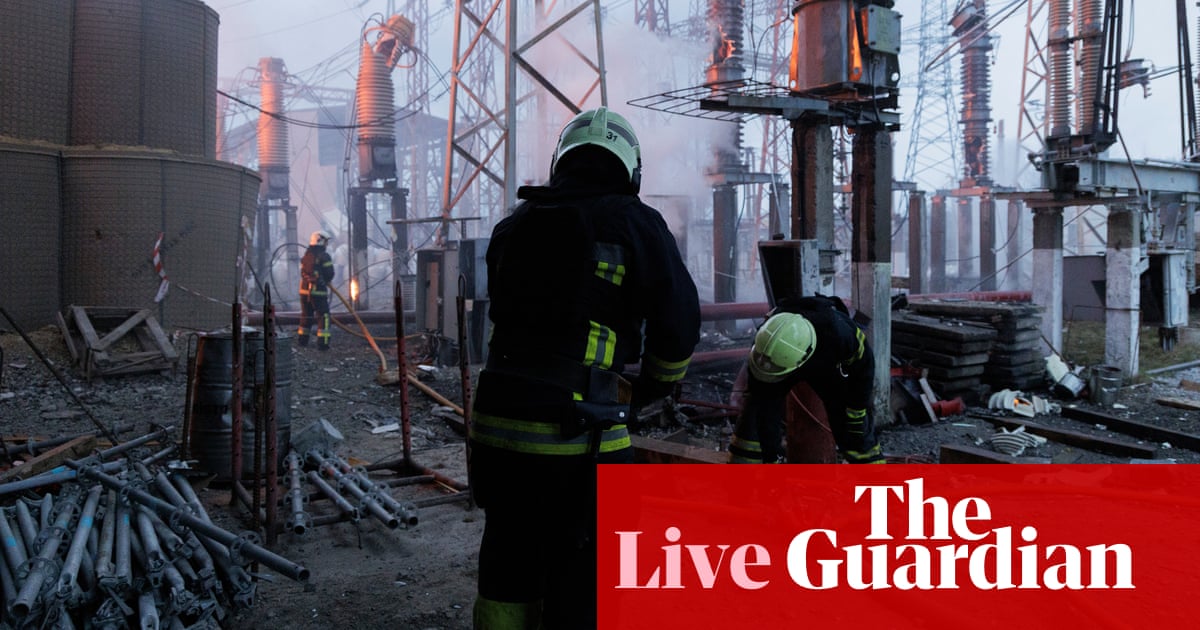
Ukraine has introduced an emergency schedule of power cuts to help stabilise the country’s energy supply, which has been badly damaged by more than 300 Russian drone and missile attacks over the past 10 days as the weather turns cooler.
The country’s president, Volodymyr Zelenskiy, said people needed to be “especially conscious of electricity consumption” from 7am and avoid using unnecessary appliances as he warned of local “stabilisation blackouts”.
Three energy facilities were destroyed by Russia on Wednesday, the president said, with a further strike reported in the region of the southern city of Kryvyi Rih overnight amid growing official alarm over the impact of the Russian campaign.
In video remarks to an EU summit on Thursday, Zelenskiy said Russia hoped to provoke a new wave of migration to European countries. “Russian terror against our energy facilities is aimed at creating as many problems with electricity and heat as possible for Ukraine this autumn and winter, so that more Ukrainians go to European countries,” he said.
In response, he said, allied nations should provide more anti-aircraft systems and impose additional sanctions on Iran, which produces some of the drones Moscow is using.
Kyiv and other parts of the country had enjoyed an unseasonably warm spell in mid-October, but on Thursday the weather was markedly cooler. The capital’s mayor, Vitali Klitschko, announced the start of the “heating season”, where municipal boilers are turned on to heat apartment blocks.
Earlier this week the president said 30% of Ukraine’s power plants had been destroyed in eight days, prompting pleas from the country for air defence systems from the west, which appeared to have been caught by surprise.
There have been more than 300 strikes on Ukrainian energy facilities since 10 October, when the Russian campaign started, said Herman Halushchenko, Ukraine’s energy minister. To help cope, the government was seeking a 20% reduction in energy use.
Some strikes have caused relatively minor damage, which engineers have been able to repair, but government insiders have acknowledged the destruction of some facilities is significant and could take more than a year to repair.
A Russian airstrike hit a major thermal power station in the city of Burshtyn, in western Ukraine, on Wednesday. It caused “quite serious” damage, the governor of the Ivano-Frankivsk region, Svitlana Onyshchuk, said on Ukrainian television.
Ukraine’s electricity transmission company, Ukrenergo, warned local blackouts of up to four hours may take place around the country at times between 7am and 10pm, because the energy system had suffered an “attack of the enemy greater than in eight months of war”.
The public were told to charge phones and other batteries overnight, while street lighting would be limited in cities. All regions of the country would be affected, said Kyrylo Tymoshenko, the deputy head of the presidential office.
The whole north-east region of Sumy, which borders Russia, said it would go the entire day without electric transport, street lighting and water, from 7am to 11pm.
A wave of drone strikes hit Kyiv on Monday morning in the district around the airport, killing five when a residential building was hit, but on Wednesday further attacks aimed at the capital were successfully intercepted.
The president said 10 Iranian-made drones were destroyed in the Kyiv area that day – and a total of 233 had been shot down during all of October, although the figures cannot be independently verified.
The relatively cheap drones are frequently inaccurate, causing civilian casualties, as they explode near power plants around the country.
Iran denies supplying the drones to Russia, while Moscow has claimed the Shahed-136 drones, rebranded as Geran-2, are made locally. But experts say there is little doubt about the origin of the drones, which have a distinctive delta wing shape – and that position was boosted by a slip on Russian television.
Ruslan Pukhov, from the Moscow-based thinktank Centre for Analysis of Strategies and Technologies, asked journalists before a television interview not to question him on the origin of the drones, unaware that he was live on air. “We all know that they are Iranian-made, but authorities haven’t acknowledged that,” he said.
The German chancellor said Russia was using energy and hunger as weapons. “Scorched earth tactics will not help Russia win the war. They will only strengthen the unity and resolve of Ukraine and its partners,” Olaf Scholz told the German parliament.
But the former Russian president Dmitry Medvedev said Scholz had forgotten the lessons of history, referring to the second world war: “The German chancellor has clearly forgotten the Nazi past of his country and the 30 million Soviet people who were killed or died of hunger and cold during the war.”
British intelligence said comments made by Russia’s principal commander, Gen Sergei Surovikin, on Tuesday that “a difficult situation has emerged” in the Kherson area meant it was likely the Kremlin was “seriously considering a major withdrawal of their forces” from west of the Dnieper River. Their position “looks shaky”, Ben Wallace, the UK defence secretary, later told MPs.
Ukrainian troops are trying to advance on the city and are believed to be making progress, although their efforts are shrouded in operational secrecy. Oleksiy Hromov, a spokesperson for the Ukrainian general staff, said Russia may leave only newly conscripted troops west of the river as it tries to evacuate up to 20,000 more-experienced soldiers.












